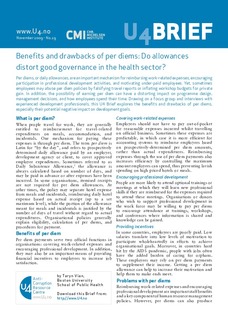Benefits and drawbacks of per diems: Do allowances distort good governance in the health sector?
| dc.contributor.author | Vian, Taryn | |
| dc.date.accessioned | 2018-01-04T08:15:51Z | |
| dc.date.available | 2018-01-04T08:15:51Z | |
| dc.date.issued | 2009-11-25 | |
| dc.identifier | oai:www.cmi.no:3523 | |
| dc.identifier.citation | Bergen: Chr. Michelsen Institute (U4 Brief 2009:29) 4 p. | |
| dc.identifier.uri | http://hdl.handle.net/11250/2474549 | |
| dc.description.abstract | Per diems, or daily allowances, are an important mechanism for reimbursing work‑related expenses, encouraging participation in professional development activities, and motivating under‑paid employees. Yet, sometimes employees may abuse per diem policies by falsifying travel reports or inflating workshop budgets for private gain. In addition, the possibility of earning per diem can have a distorting impact on programme design, management decisions, and how employees spend their time. Drawing on a focus group and interviews with experienced development professionals, this U4 Brief explores the benefits and drawbacks of per diems, especially their potential negative impact on development goals. | |
| dc.language.iso | eng | |
| dc.publisher | Chr. Michelsen Institute | |
| dc.relation | U4 Brief | |
| dc.relation | 2009:29 | |
| dc.relation.ispartof | U4 Brief | |
| dc.relation.ispartofseries | U4 Brief 2009:29 | |
| dc.relation.uri | https://www.cmi.no/publications/3523-benefits-and-drawbacks-of-per-diems | |
| dc.subject | Corruption in Aid | |
| dc.subject | Health | |
| dc.title | Benefits and drawbacks of per diems: Do allowances distort good governance in the health sector? | |
| dc.type | Report |
Tilhørende fil(er)
Denne innførselen finnes i følgende samling(er)
-
Publications [1488]
